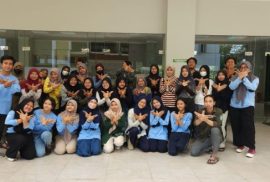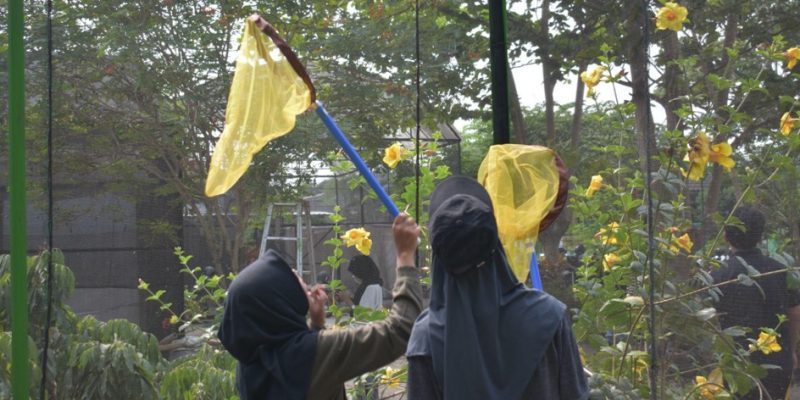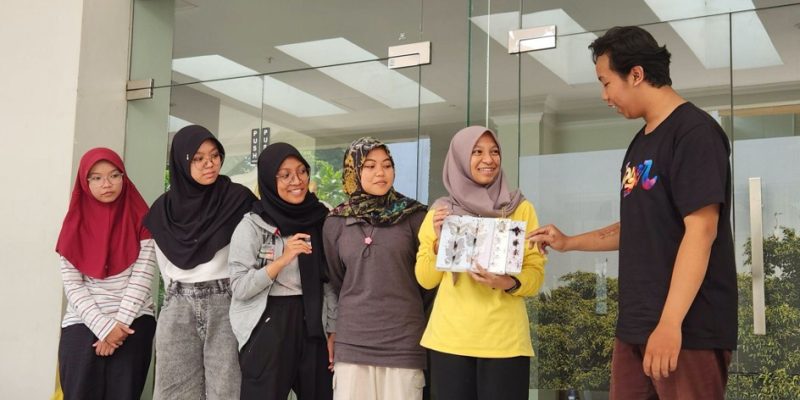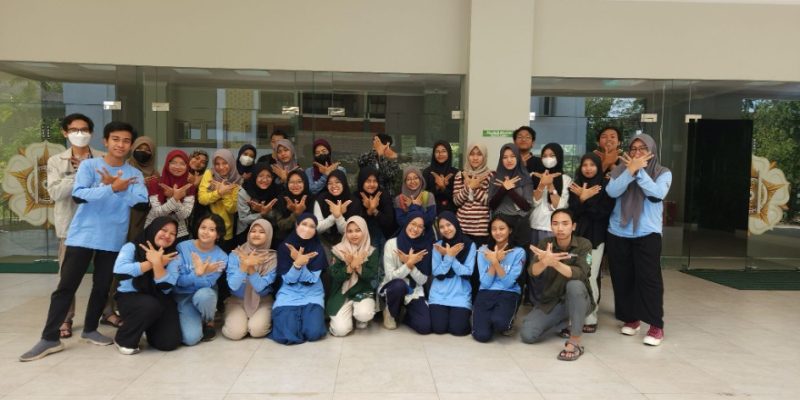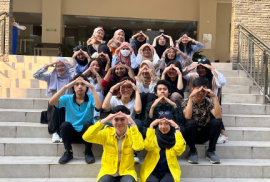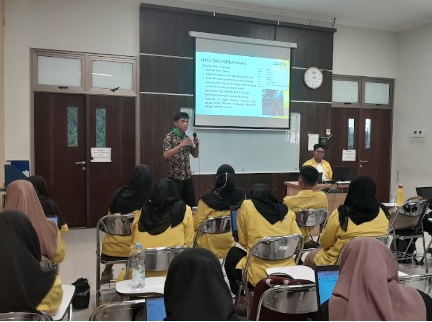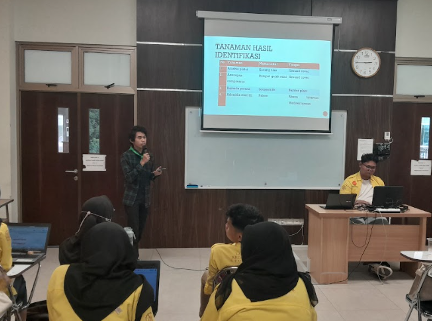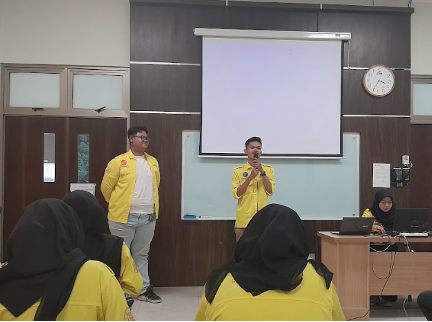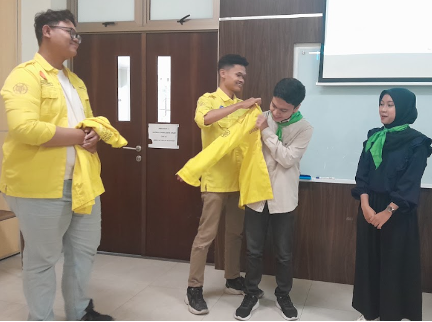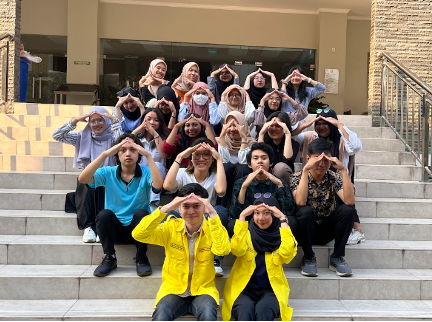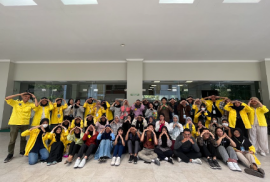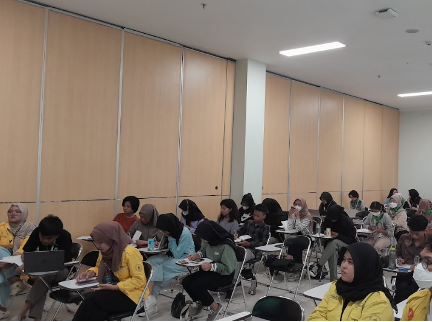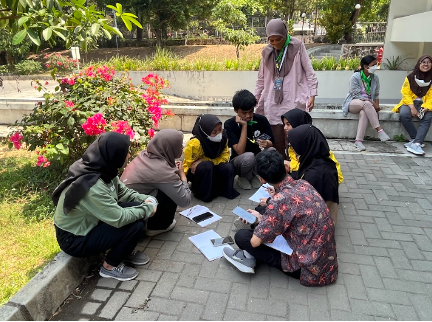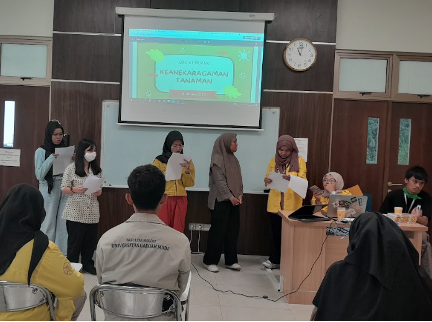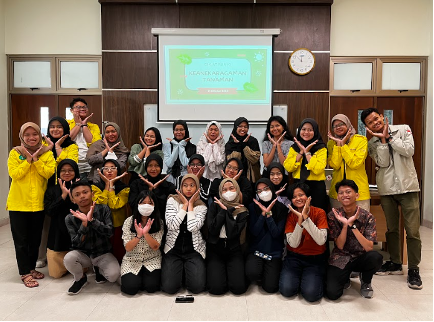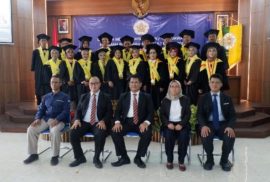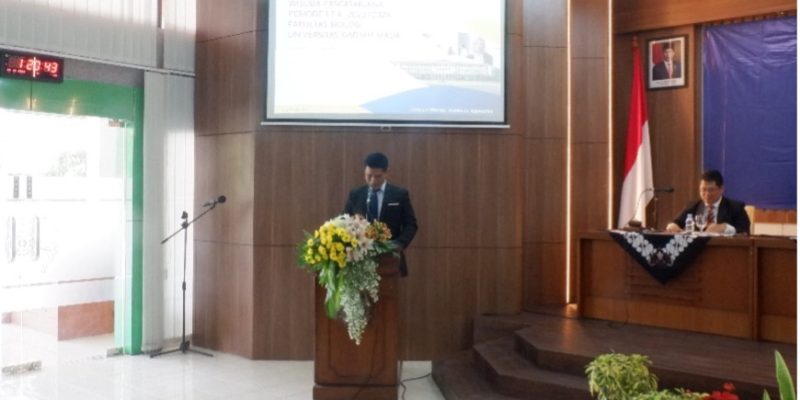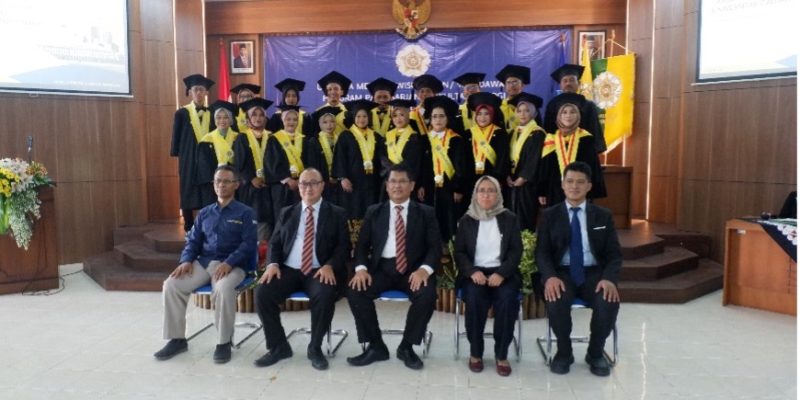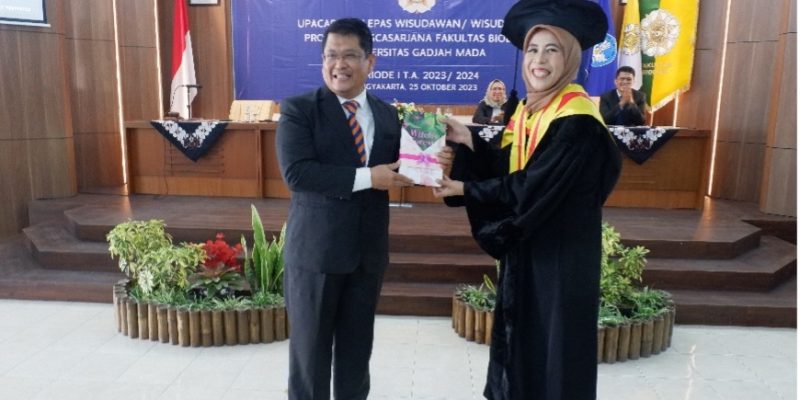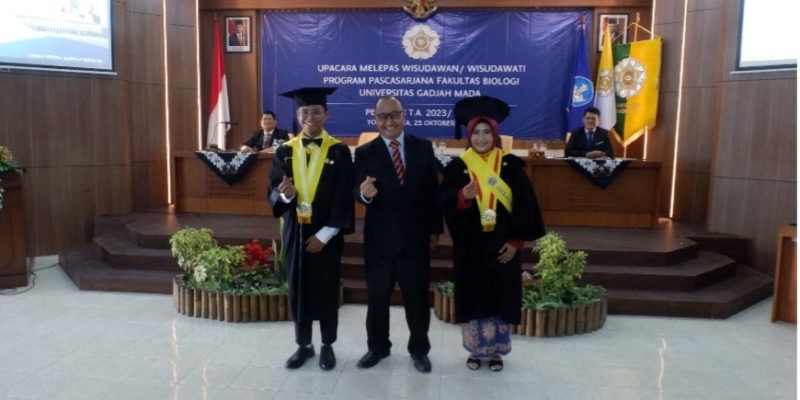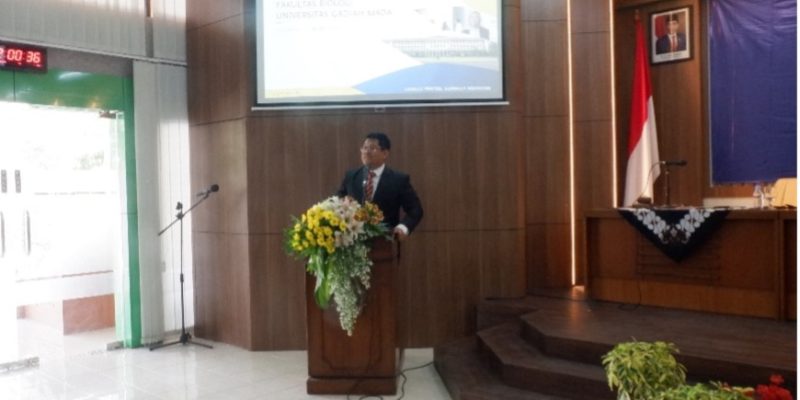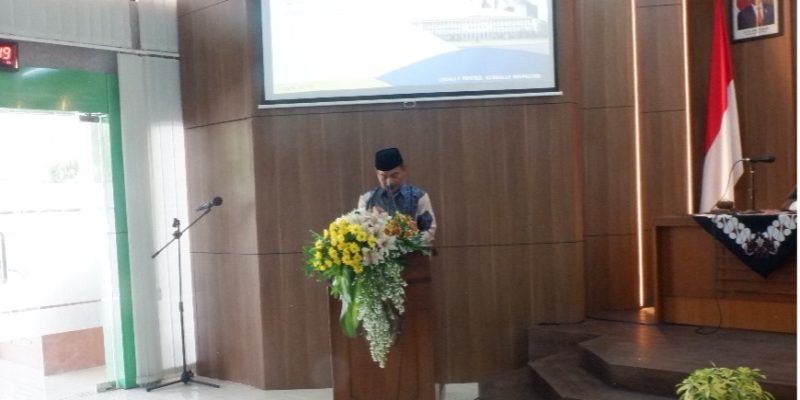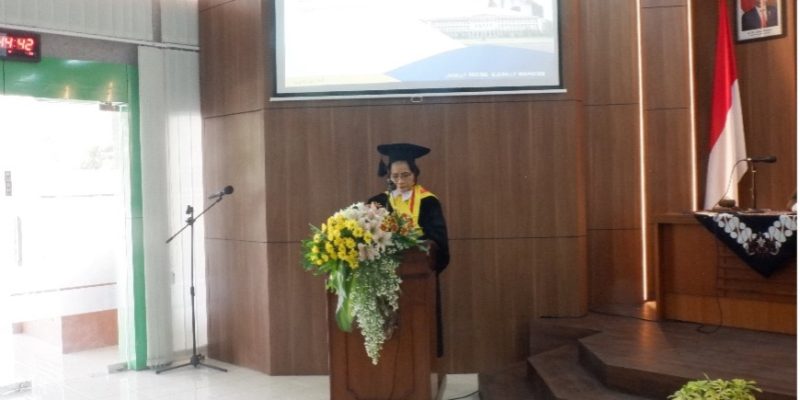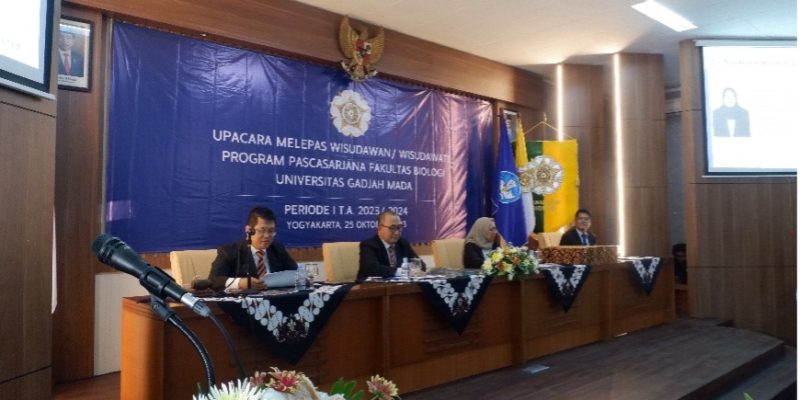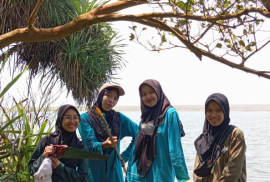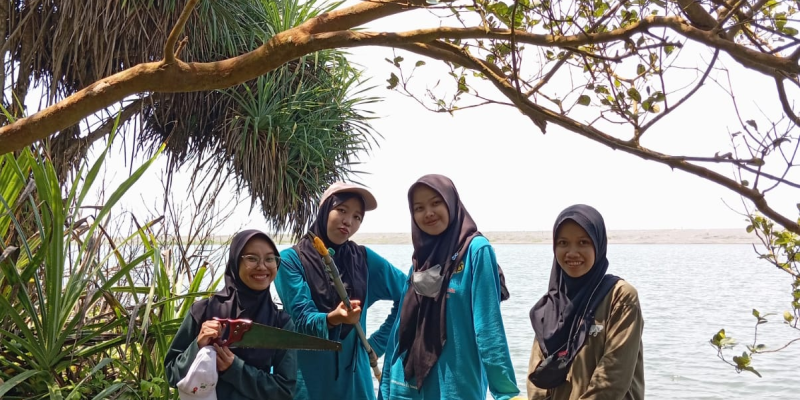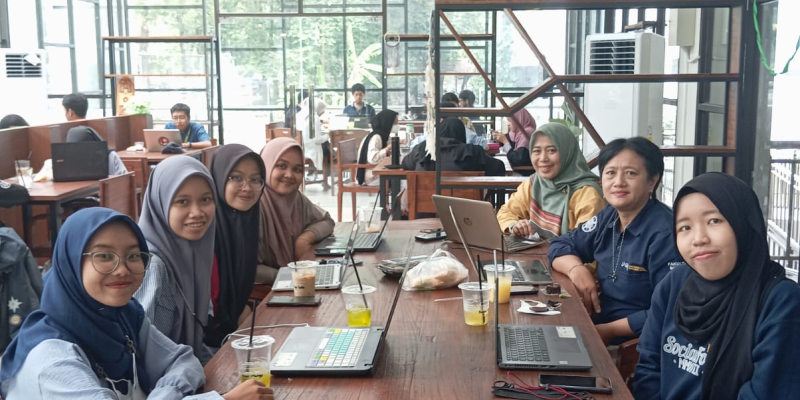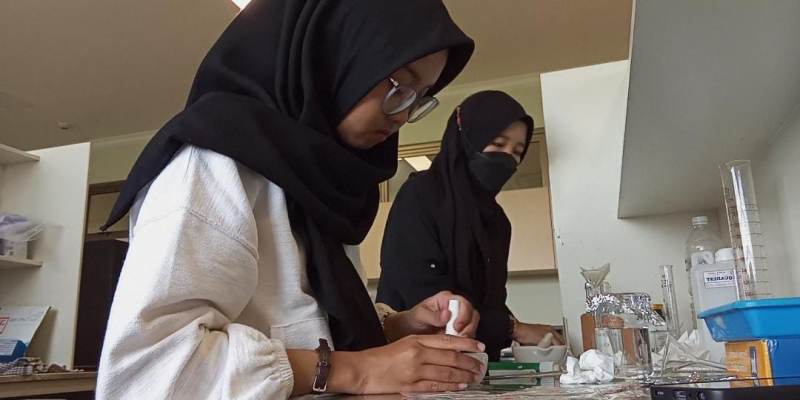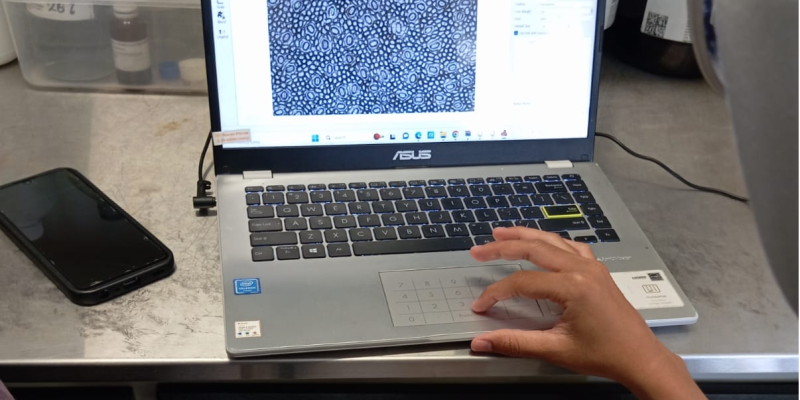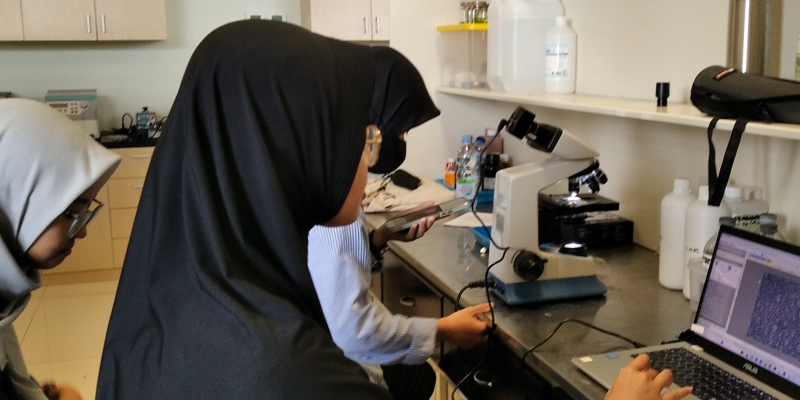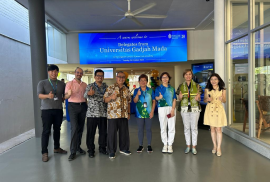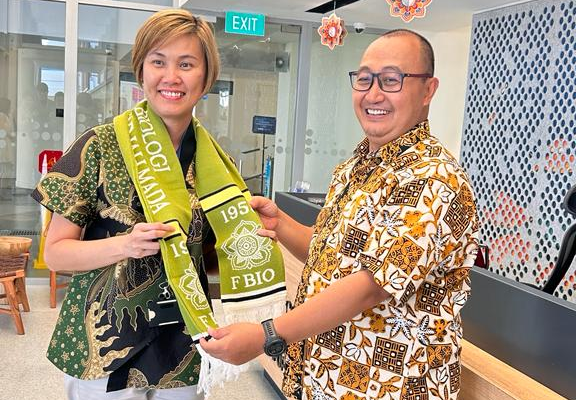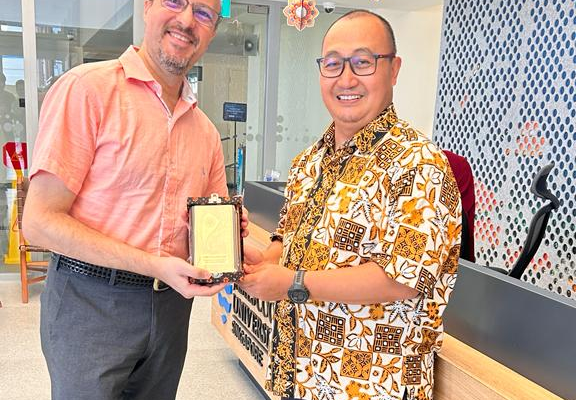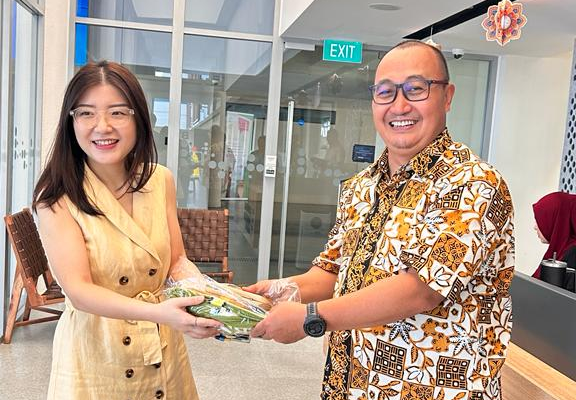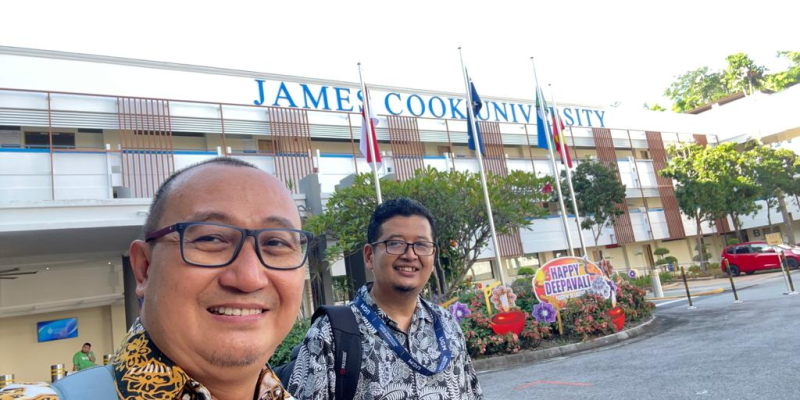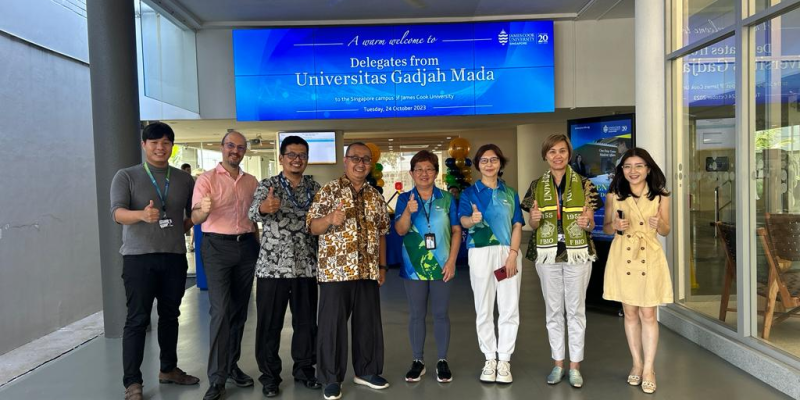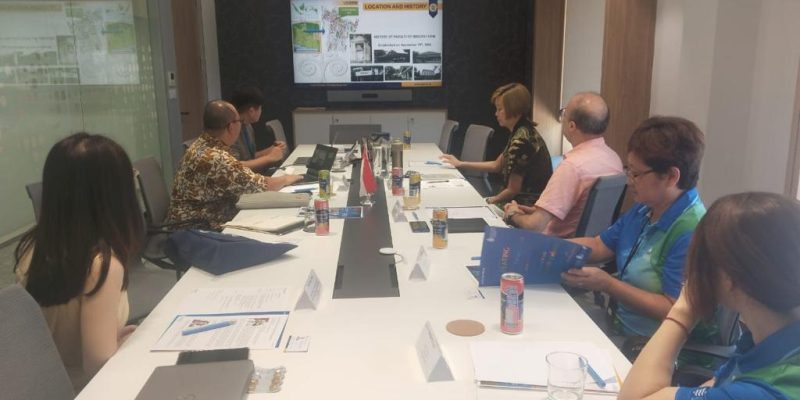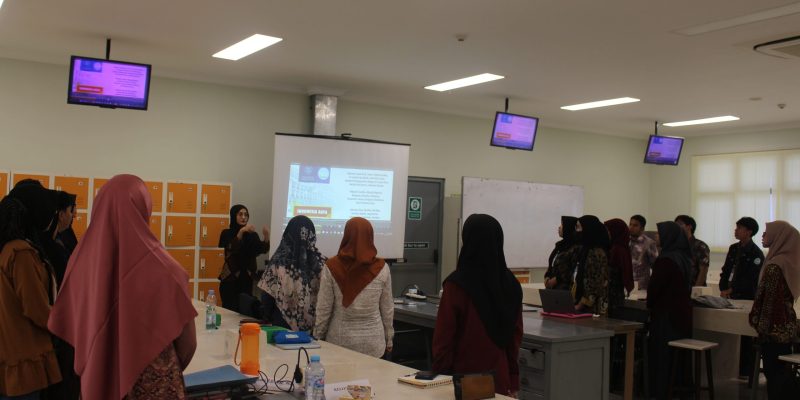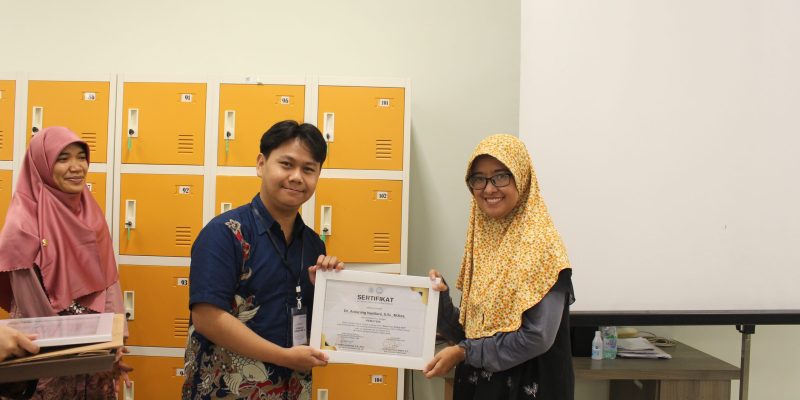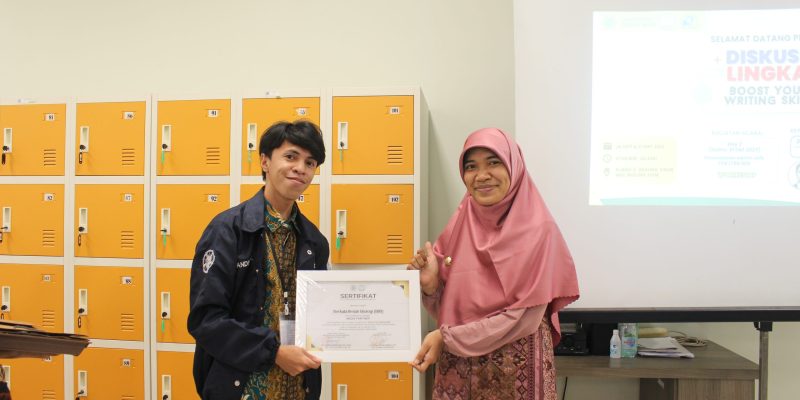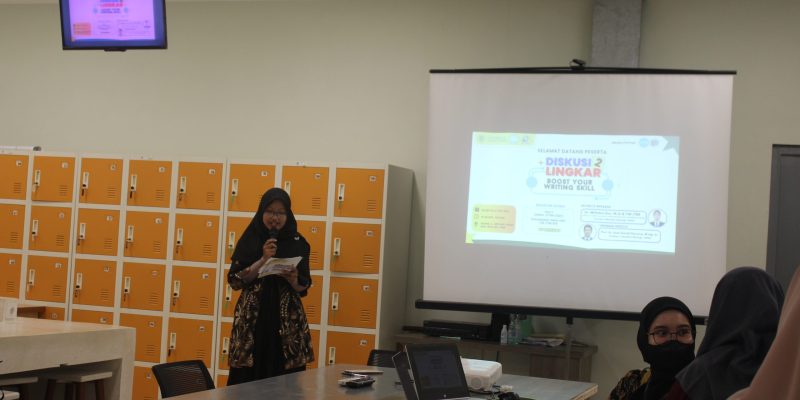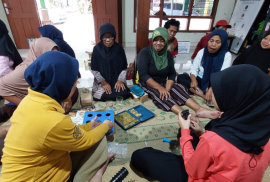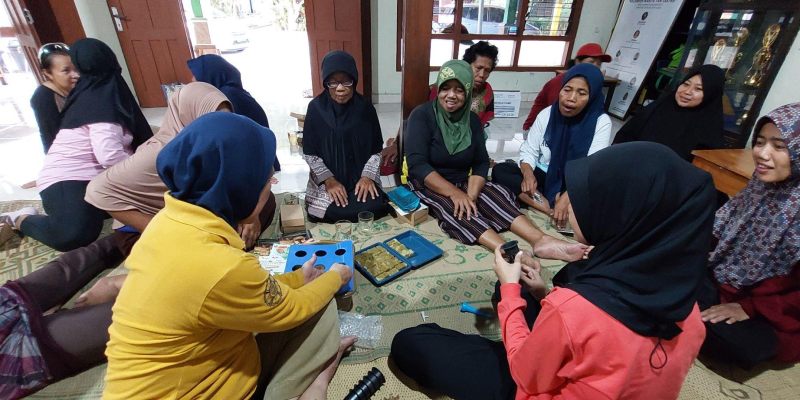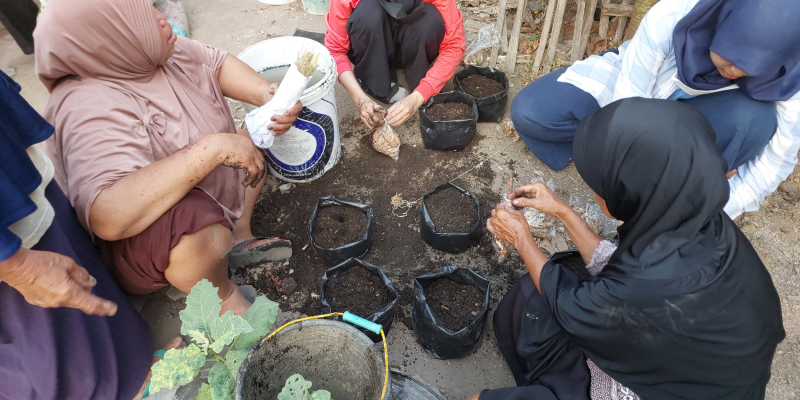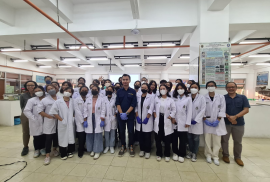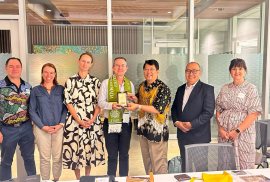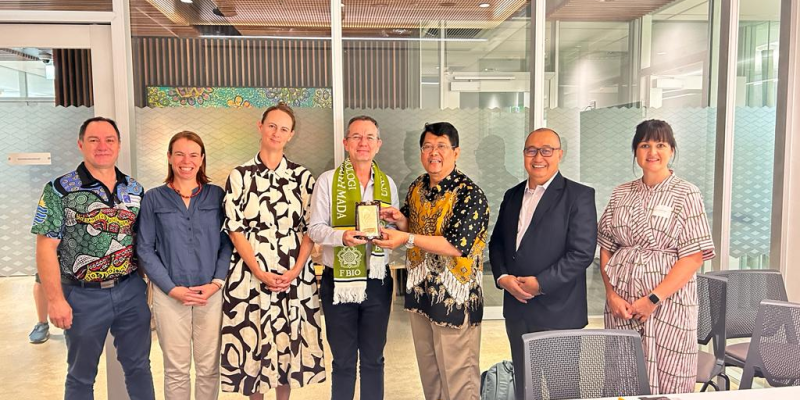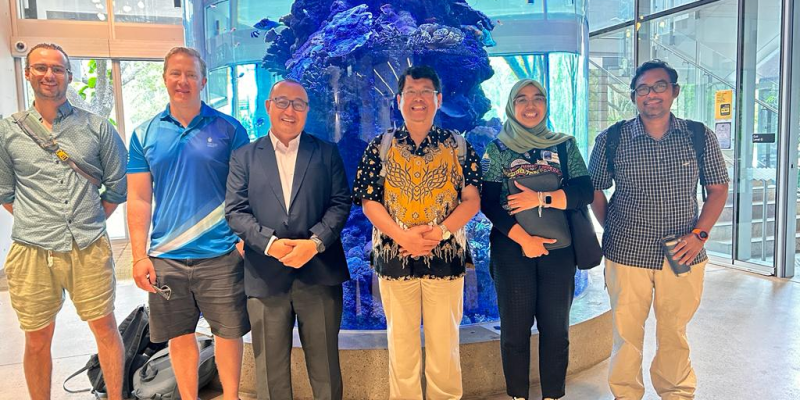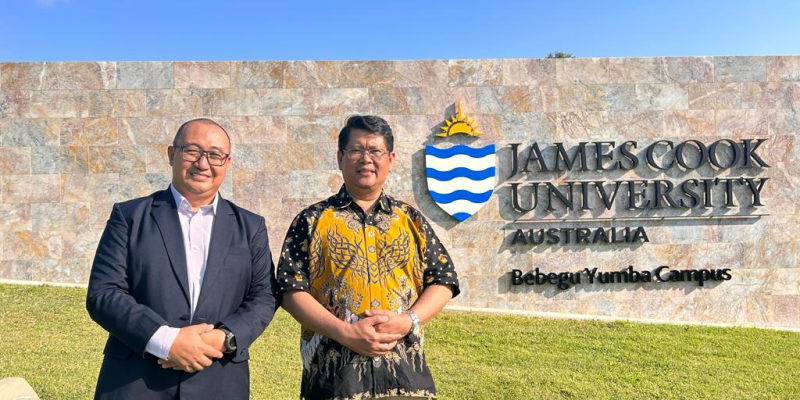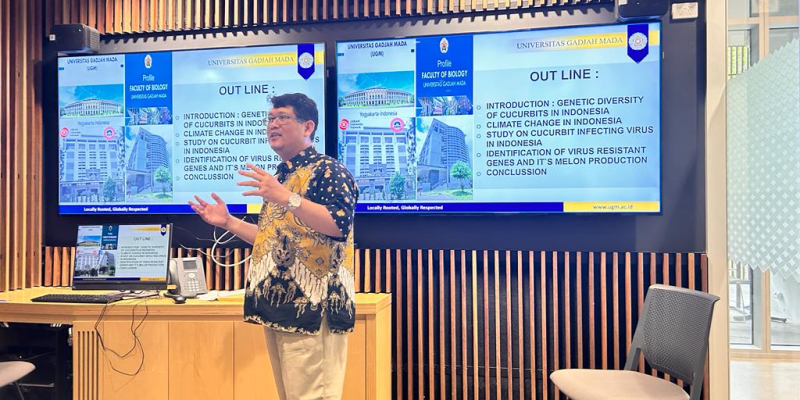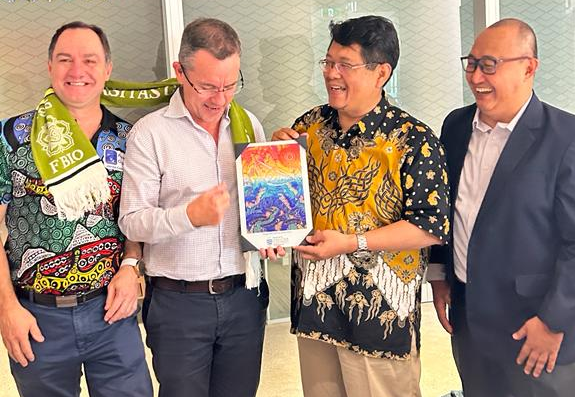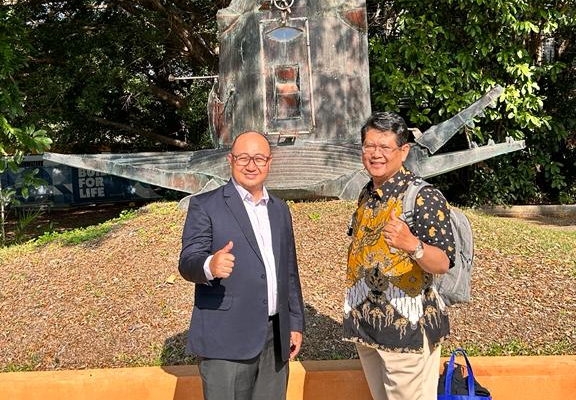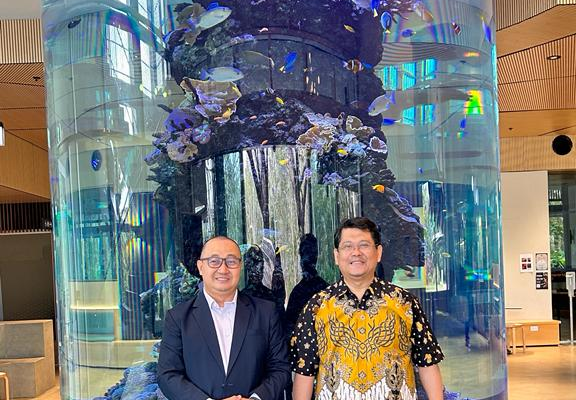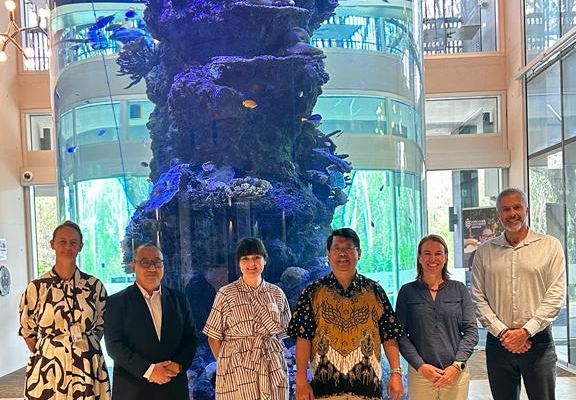Arsip:
News Release
Yogyakarta, Sunday, October 22, 2023 – The Entomology Study Group (Kelompok Studi Entomologi/KSE) organized one of the activities in the Open Recruitment series, namely the Field Training aimed to enhance the insight of KSE members, specifically the “Telur” (new members), in conducting direct insect sampling and practicing insect preservation methods. The Field Training took place at the Sawit Sari Research Station, Faculty of Biology, UGM, and the South Terrace of Building B, Faculty of Biology, from 7:45 AM to 2:00 PM and was attended by the Telur KSE and the organizing committee, and it was guided by Regina Nilamsari (KSE XXIV).
The Field Training activity began with giving instructions and a general overview of the activities to the Telur. Subsequently, the Telur started preparing the sampling equipment in their respective groups with the assistance of their guides. In conducting the sampling, the Telur were divided into 3 groups based on the type of vegetation, including artificial plants, monoculture plants, and polyculture plants. The Telur enthusiastically carried out the sampling activity, which started from 8:00 AM to 10:00 AM. The sampling activity was conducted actively using sweep nets and aerial nets according to the type of insects to be preserved.
After the sampling activity was completed, they returned to the Faculty of Biology to preserve the insects they had collected earlier. In carrying out the preservation activity, three different methods were used: pinning, spreading, and carding, depending on the characteristics of the insects. The preservation activity was done in groups, assisted by their respective guides. Subsequently, the Telur presented the insects they had obtained in each vegetation area. After a break for prayers and lunch, the entire series of activities concluded with a group photo. [Author: KSE]
On Sunday, October 22, 2023, the Upgrading Seminar for Seedlings of KSAT, a part of the academic series of KSAT, was successfully held AT Room II of Building B, Faculty of Biology UGM. The Upgrading Seminar for Seedlings is the formal induction of members into the Landscape Architecture Study Group (KSAT) after completing the entire Acclimatization Phase I, which includes the Pre-Acclimatization I Paper, Small Group Discussion (SGD) series, Seedling Knowledge Classes, and the Oral Examination. The sequence of Seedling Knowledge Upgrading began with the Seedling Independent Project, which was then presented to a forum involving the Chairperson, Knowledge Division, Alumni (KSAT 2018), representatives from each batch in KSAT (KSAT 2020, KSAT 2021, and Prospective Members of KSAT 2023).
The seminar commenced with an opening address and prayer by the MCs, Syariva Habiba and Muhammad Hafid Dinata (KSAT 2020). It was followed by a welcome speech from the Coordinator of General Knowledge in KSAT, Muhammad Hafid Dinata (KSAT 2020). Next, the main activity took place, which was the Project Results Seminar Session, followed by a discussion session. The Project Results Seminar was divided into two sessions, Session I consisting of 14 Seedlings and session II consisting of 12 seedlings. Following all Seedlings’ presentations, the Upgrading Ceremony was conducted by Zildan Basara (Chairperson of KSAT 2023), which included the reading of the commitment pledge as a form of responsibility for Seedlings who officially progressed to the Sapling stage, and the pinning of the KSAT emblem to the representatives of KSAT 2022. The event concluded with a closing prayer and a group photo and it is hoped that the Seedlings who have officially progressed to the Sapling stage will always maintain their spirit and commitment, and will take on the responsibility of representing KSAT with pride. Additionally, it is anticipated that KSAT will continue to establish deep roots and become a robust force, penetrating through civilization, ultimately becoming a study group that brings benefits to the surrounding environment, academia, and the wider community. [Author: KSAT 2023]
On Saturday, October 21, 2023, the Soft Skills Training session for prospective members of KSAT, part of the KSAT Open Recruitment series, was successfully conducted. As part of the Open Recruitment process, each Sub-Division conducted specialized training sessions, including Soft Skills Training, for the New Member Candidates of KSAT 2023 (Prospective Seedlings). The fourth session of Soft Skills Training covered fundamental topics related to Soft Skill Development, conducted in-person at Room III of the Faculty of Biology, UGM. The objective of the event was to provide insights on how to foster teamwork and maintain synergy within a team for the prospective Seedlings of KSAT.
The event began with an opening address and prayer by the MCs, Irfan Agus Nugroho (KSAT 2021) and Jovanka (KSAT 2022). Following this, the session’s content was delivered by Uzda Nabila Fatkhan (KSAT 2018), the Coordinator of the Knowledge Sub-Division of KSAT 2021. The content covered the goals of team collaboration, forms of teamwork in daily life with examples, the importance of teamwork in everyday life, elements necessary for effective teamwork, forms of teamwork, steps in managing teamwork, the outcomes of successful teamwork, and how to maintain it. Subsequently, there was an interactive discussion session between the Prospective Seedlings and the Speaker.
After the instructional session, the Prospective Seedlings were divided into four groups for games. The games included two types: Game 1, a team-based wind-grabbing game, and Game 2, a large-scale group tic-tac-toe game. The winning group received prizes from the Committee. Additionally, there was a communal meal featuring pre-arranged sandwiches and an opportunity for participants to share their impressions and messages. The event concluded with a closing prayer and a group photo, it is hoped that the prospective Seedlings of KSAT at the Faculty of Biology, UGM, will have a foundational understanding of how to build teamwork and sustain synergistic collaboration. Furthermore, it is anticipated that KSAT will continue to establish deep roots and become a robust force, penetrating through civilization, ultimately becoming a study group that brings benefits to the surrounding environment, academia, and the wider community. [Author: KSAT 2023 Open Recruitment Committee]
On Wednesday, October 25, 2023, the Faculty of Biology Universitas Gadjah Mada held a Graduation Ceremony for the Postgraduate Program 2023/2023 I period at Auditorium Biologi Tropika. The ceremony was inaugurated by the Dean of the Faculty of Biology, UGM, Prof. Dr. Budi Setiadi Daryono, M.Agr.Sc. Also present were the Vice Dean for Research, Community Service, Collaboration and Alumni, Dr. Eko Agus Suyono, S.Si., M.App.Sc., the Head of the Master’s Program (Dr.rer.nat. Andhika Puspito Nugroho, S.Si., M.Si.), the Head of the Doctoral Program (Dr. Endah Retnaningrum, M.Eng.), and all committee members involved in the event.
The event commenced at 1:00 PM (WIB), with the opening remarks by Prof. Dr. Budi Setiadi Daryono, M.Agr.Sc., the Dean of the Faculty of Biology, UGM. This was followed by the singing of the national anthem, “Indonesia Raya,” the Gadjah Mada University Hymn, and the Faculty Biology March. The event continued with a traditional dance performance from Banyuwangi, East Java, titled “Tari Sorote Lintang Kemukus” presented by the Gebyar Laskar KMP from the Faculty of Biology.
The graduation report was delivered by Dr.rer.nat. Andhika Puspito Nugroho, S.Si., M.Si., the Head of the Master’s Program . The First Period of Academic Year 2023/2024 there were four graduates from the doctoral program, two graduates with cumlaude predicates and two with very satisfaction predicates, the average length of study was 4 years and 8 months and the average GPA was 3.99. For the Master Program there were 15 graduates with six graduates with cumlaude predicates, 8 graduates with very satisfaction predicates and one graduate with satisfaction predicates, the average length of study was 2 years and 9 months and the average GPA was 3.70. The Highest GPA was obtained by Clara Artha Febriana, S.TP., M.Sc., with a GPA of 3.97.
Next, there is a reading of the graduates graduation results by Prof. Dr. Budi Setiadi Daryono, M.Agr.Sc., the Dean of the Faculty of Biology, UGM. Furthermore, there was a speech by representatives of the postgraduates by Dr. Sari Budi Moria Sembiring, M. Biotech. He expressed congratulations to the graduates who have reached the pinnacle of success after undergoing a lengthy and challenging process, adapting to online learning during the Covid-19 pandemic. The various challenges faced have taught the graduates to adapt to diverse conditions, manage their time, self, and prioritize effectively, making them stronger and more resilient. She also expressed gratitude to all the professors and educators who have imparted invaluable knowledge, leading to a profound understanding of biological sciences and serving as motivation for further academic pursuits. She extended her thanks to the thesis and dissertation advisors for their guidance, motivation, and direction in research and thesis writing, enabling the successful completion of master’s and doctoral degrees. She hoped that the knowledge gained would be of benefit to society and the surrounding environment and wished for the Faculty of Biology, UGM, to continue to excel and become the best in Indonesia. Her address concluded with a poem, “salad with pomfret, the red pomfret, graduation is the beginning, for a brighter future ahead.”Followed by remarks from the parents’ representatives by Mr Muslim, S.Ag., parents of Risyda Hayati, S.Pd., M.Sc. He expressed his gratitude to the Faculty of Biology and also noted that the graduates would become remarkably interesting individuals due to their intelligence and capabilities. On behalf of the parents, he emphasized that no matter how high the knowledge acquired, the graduates would always be their children. Therefore, he hoped that the graduates would be individuals who could actualize whatever they gained. The address concluded with a quatrain, “tanjung pinang tanjung kelaya, people adorned in academic regalia, hearts filled with genuine joy, parents witnessing their children’s graduation.”
Following the address, a pin was awarded as a sign of membership in the Faculty of Biology Family by the Vice Dean for Research, Community Service, Cooperation and Alumni, Dr. Eko Agus Suyono, M.App.Sc. to representatives of graduates Dr. Rina Arimarsetiowati, S.P., M.Sc., and Muhammad Said Rifqi, S.Pd., M.Sc.. The final address was delivered by Prof. Budi Setiadi Daryono, M.Agr.Sc., the Dean of the Faculty of Biology, UGM. He extended a warm welcome to the graduates and parents from 11 provinces, expressing joy at the graduation event. He expressed gratitude for the opportunity to gather in the Auditorium Biologi Tropika of the Faculty of Biology, UGM, to celebrate this momentous occasion. He also congratulated the doctoral and master’s graduates and encouraged them to further their education, including the utilization of scholarships provided by the government, such as the LPDP and BPI scholarships. The Faculty of Biology, UGM, also offers scholarships for both master’s and doctoral programs every year (regular or By Research). Furthermore, the doctoral program includes a double-degree option, where the Faculty of Biology was the first to confer a double-degree doctoral program from UGM and a partner university in France. On behalf of the faculty, he prayed for the graduates already in the workforce to have successful careers and expressed that the Faculty of Biology would be delighted if the graduates collaborated with their alma mater. For graduates not yet employed, he hoped they would soon find desired positions in line with their aspirations. He also apologized for any shortcomings in services and education experienced by the graduates. He expressed gratitude to the professors, laboratory heads, and educational staff who have guided, taught, and served the students and alumni. In closing, he asked the parents to continue praying for the success of the graduates. His address concluded with the couplet, “rice cake with coconut milk, let forgiveness be granted” and “flamboyant flowers, basil flowers, that’s all, and thank you.”
The event concluded with the presentation of mementos from the graduates of the First Period of Academic Year 2023/2024, represented by Dr. Fitri Nadifah, S.Si., M.Sc., to Mr. Dean of the Faculty of Biology, UGM. The ceremony ended with a prayer led by Mr. Sumarno, S.Si., M.Sc., followed by a group photo. This graduation ceremony demonstrates that despite challenges, this important moment can still be celebrated smoothly and joyfully, with 19 graduates in attendance, accompanied by their parents or representatives, in the Tropic Biology Auditorium of the Faculty of Biology at Gadjah Mada University. [Author: KMP]
As part of the MBKM (Merdeka Belajar Kampus Merdeka) research activities for the academic year 2023, titled “Analysis of growth, carbon biomass, flowering, and hormone content in Rhizopora mucronata Lamk. propagules in the Mangrove Conservation Forest, Baros Beach, Bantul,” several field and laboratory activities were conducted by Muhammad Rafie, Halimatur Rosyida, Luthfi Azizatul Ulya, Tsabitah Putri Asmalda, Azzah Fauziyatul Hana, and Septiana Tri Utami under supervised by Prof. Dr. Kumala Dewi MSc.St. and supported by BRIN partners Prof. Dr. Liliana Baskorowati S.Hut. M.P. The MBKM research for the odd semester of 2023/2024 began with an online meeting with Prof. Dr. Liliana Baskorowati S.Hut. M.P., on August 25, 2023. During the meeting, preparations for the subsequent sample collection and the paper preparation for publication in a journal were discussed.
Following this, on September 27, 2023, at the Plant Physiology Laboratory of the Faculty of Biology the team discussed the abstract of the research results titled “Carbon sequestration potency of Rhizophora mucronata Lamk. in mangrove conservation forest, Baros Beach, Bantul,” which will be presented at the “2nd International Conference on Nature-Based Solution in Climate Change Resilience” organized by Pertamina Foundation in collaboration with the University of Pertamina, scheduled for November 24, 2023, at Graha Pertamina, Jakarta. Through the process of writing the full paper, students learned how to calculate the carbon absorption potential by R. mucronata in the Baros Beach conservation forest. Additionally, they practiced analyzing the relationship between salinity and substrate pH with the growth, carbon dioxide absorption capacity, and biomass of R. mucronata.
Fieldwork was conducted on September 28, 2023, accompanied by the conservation area manager, Mr. Muhammad Sidiq Nurcholis. During this activity, students collected leaf and root samples at 5 measurement points (PU). Leaves were collected from both sun-exposed and shaded areas. Chlorophyll content was measured directly in the field using a chlorophyll meter. Additionally, chlorophyll content was tested using leaf extraction and absorbance measurement with a spectrophotometer. Through these two measurements, students were able to evaluate and compare the accuracy of chlorophyll measurements between non-destructive (using a chlorophyll meter) and destructive (using a spectrophotometer) methods. Furthermore, observations were made on the number of stomata on R. mucronata leaves exposed directly to sunlight and those in shaded areas. Propagule extraction was also performed, and samples were sent for hormone content testing. From this research activity, students gained experience in observing Rhizopora mucronata plants in the Baros forest, evaluating the relationship between environmental conditions and the growth and carbon dioxide absorption capacity of mangrove plants. It is hoped that this experience will provide students with valuable knowledge to participate in various activities related to global climate change mitigation.
Singapore, 23 October 2023 – The Faculty of Biology is expanding its collaboration network at the international level by initiating research and academic collaboration with the best institutions in the world, one of which is James Cook University (JCU) Singapore. The Faculty of Biology delegation included Dr. Eko Agus Suyono, M.App.Sc. as Vice Dean for Research, Community Service, Collaboration and Alumni Affairs and Sukirno, S.Si., M.Sc., Ph.D. as Head of the Faculty of Biology Undergraduate Study Program visited JCU Singapore, following a collaborative visit to JCU Australia previously last Thursday (19/10).
The James Cook University campus in Singapore is wholly owned by Australia’s James Cook University, which is ranked in the top 2% of universities in the world. JCU Singapore was founded in 2003 as an effort by JCU Australia to internationalize its activities and offer a series of programs at the Singapore Campus covering the fields of business, Information Technology, Psychology, Science Education, Commerce, Accounting, aquaculture, Environmental Science, Game Design, Tourism and Hospitality. JCU Singapore also provides courses at pre-university level specifically designed to provide a pathway for students who cannot immediately meet university entry standards. Located on Sims Drive, JCU Singapore provides students with access to various learning support facilities and services, including lecture and seminar halls, libraries and related learning facilities, computer laboratories, aquaculture research and teaching facilities, financial laboratories and access to various sports facilities.
The collaborative discussion was also attended by Professor May Tan-Mullins as Dean International and Chief Sustainability Officer, Assoc. Prof. Roberto Dillon as Academic Head of Science and Technology, Cassandra Lee as Director, Recruitment & Partnerships, Dr Susan Gibson-Kueh, as Senior Research Fellow of Aquaculture, Dr Shen Xueyan as Senior Lecturer of Aquaculture, Shelley Wang as Senior Manager, International Management and Senior Regional Manager, Recruitment & Partnerships and Ben Ng as Assistant Manager, International Management JCU Singapore. The meeting was a follow-up to discussions on cooperation initiation that had previously been held online. The cooperation discussion component includes the initiation of collaboration in the field of Aquaculture, including double degree program collaboration as well as joint supervision and joint research. Apart from that, JCU Singapore is also interested in student mobility & exchange opportunities, and plans to develop the Faculty of Biology UGM Jakarta campus in a double degree master program on MBA on bioentrepreneurship and biobusiness.
This discussion is a great bridge to increase the collaboration network between Universitas Gadjah Mada, especially the Faculty of Biology and James Cook University, Singapore. In addition, this collaboration is in line with the Faculty of Biology’s commitment to increasing cooperation for international recognition in accordance with its support for the Sustainable Development Goals, SDG 17 as well as improving the quality of inclusive and high-quality education (SDG 4) and competing with the best institutions in the world.
On Saturday, October 21, 2023, the Graduate Student Family (KMP) of the Faculty of Biology at UGM, under the Natha Abhipraya Cabinet, held the Circle II Discussion Session 2 event. This event followed the previous Session 1 on September 28, 2023, and was one of the working programs conceptualized as a discussion forum by the Strategic and Scientific Studies Division (Kastrak) of the KMP Faculty of Biology at UGM. The activity focused on the theme “Boost Your Writing Skill,” with the aim of enhancing the writing proficiency of graduate students, enabling them to produce high-quality manuscripts eligible for publication in reputable journals.
The event took place in the Teaching Laboratory on the 2nd floor of the Sinar Mas Building, Faculty of Biology at UGM, the Circle II Discussion Session 2 was attended by 20 participants, including master’s and doctoral students from the Faculty of Biology at UGM. The second day’s activities commenced at 08:30 AM local time, led by Faradilla, S.Si., as the MC, and began with a collective prayer followed with the singing of the Indonesian national anthem, “Indonesia Raya,” the Gadjah Mada Hymn, and the Biology UGM March, conducted by Tamalia, S.Pd. Subsequently, the event transitioned into a workshop. Participants were divided into two large groups, with the first group guided by Dr. Ardaning Nuriliani, S.Si., M.Kes., and the second group led by Nur Indah Septriani, S.Si., M.Sc., Ph.D. Both discussion leaders were faculty members and editors of journals at the Faculty of Biology at UGM, namely the Journal of Tropical Biodiversity and Biotechnology (JTBB) and the Berkala Ilmiah Biologi (BIB).
After the first session of The Circle II Discussion, 11 articles were collected and reviewed by the editors. The initial phase of the workshop commenced with introductions and brief profile stories from the discussion leaders and participants. In the first group, the discussion began by selecting one scientific article to discuss each section, starting with a title.The article titles were required to be intriguing while accurately representing the content, and must be a maximum of 14 words. The discussion then progressed to address the abstract and its most crucial component, the keywords, to make it easier for readers to find suitable journals. The abstract should also encompass objectives, results, and even conclusions, without including references. Among the submitted articles, there were inconsistencies in the abstract content, such as vague methodology and the absence of conclusions.
In the introduction section, the discussion leaders emphasized the importance of writing coherently and cohesively to ensure readers grasp the intended flow of information. Some participant-written articles tended to lack coherent and cohesive information, necessitating revisions. Additionally, the method points should be detailed, include subsections, and if software is utilized, it must be mentioned. In the results section, an introduction is presented before entering the tables, and after the tables, table descriptions are provided prior to the discussion. However, adherence to the target journal’s writing format is essential. The final point, the conclusion, should encompass research findings’ summaries and highlight the study’s significant outcomes. It is also crucial to indicate whether the hypothesis was accepted or rejected, with appropriate references provided. The discussion proceeded smoothly, driven by the participants’ enthusiasm. Some participants expressed gratitude, feeling motivated to write as a result of participating in the Circle II Discussion.
The activity concluded with the presentation of mementos from the Committee to the Workshop Discussion Leaders of Circle II. Dr. Ardaning Nuriliani, S.Si., M.Kes. and Nur Indah Septriani, S.Si., M.Sc., Ph.D. The event ended at 10:30 AM and was followed by a group photo. The Circle II Discussion event is anticipated to become a regularly held activity, addressing the needs of graduate students in Biology at UGM for writing, research, and publication in reputable scientific articles.
On Friday, October 20, 2023, the Community Engagement Activity Team of the Independent Learning Program (MBKM-PkM) at the Faculty of Biology, UGM, led by Prof. Rarastoeti Pratiwi, along with Aisya Syam Mahanani, Lathifa Haya Nuraziza, and Oktaviani Setiati, conducted the event “Socialization and Training for the Cultivation of “Living Pharmacy” and Functional Foods for Women Farmer Groups in the Malangrejo Hamlet.” This activity took place at the Malangrejo Population Data Center, Wedomartani Village, Ngemplak, Sleman, Yogyakarta Special Region. The event was attended by the Head of Malangrejo Hamlet (Mr. Sarbini) along with the Chairwoman of the Women Farmers Group (KWT) in Malangrejo (Mrs. Isti Maryati), as well as the members of the Women Farmers Group.
This event was a continuation of the PkM-MBKM program in the second semester of 2023. The aim of this activity is to expand the collection of plants with medicinal properties for both treatment and daily bodily needs supply. Additionally, another objective of this activity is to provide alternative, healthier, and more practical methods of plant cultivation, as well as alternative methods of watering plants suitable for the recent dry season. In the cultivation of Living Pharmacy (TOGA), white ginger, red ginger, turmeric, mango turmeric, white turmeric, lesser galangal, lemongrass, and galangal seeds were used and planted in polybags with soil as the medium and a drip irrigation method. This irrigation method uses plant infusions and plastic bottles to optimize water usage during the dry season. Unlike TOGA, functional food plants such as lettuce, water spinach, chili, bok choy, as well as tomatoes were used and planted using hydroponic methods with rockwool as the medium.
The socialization and training activities began with opening remarks from the Activity Chair, the Head of Malangrejo Hamlet, and the Chairwoman of KWT Malangrejo. Prior to the socialization on TOGA and functional food plants, a pre-test questionnaire was conducted, and booklets titled “Types and Cultivation Methods of TOGA and Functional Plants” were distributed. This socialization activity covered the characteristics, benefits, planting methods, maintenance, and harvesting methods for each plant, as well as the methods of hydroponic cultivation and infusion watering. Additionally, information was provided about the types of TOGA and functional food plants to be cultivated, as well as a layout sketch according to the plant type and yard conditions. The socialization activities were followed by a discussion on technical aspects of cultivation, especially hydroponic planting, and the application of infusion watering methods with plastic infusion bottles. The socialization and training activities concluded with the completion of a post-test questionnaire to measure the increase in knowledge among the KWT women regarding the cultivation of TOGA and functional food plants. The results showed that the participants’ (in this case, KWT women) knowledge about the cultivation of TOGA and functional food plants increased by 23.5%.
The activities continued with the accompanied planting of TOGA and functional food plants. This planting activity is one of the implementations of the PkM-MBKM activities that took place over two semesters in 2023. The rainless weather supported the joint planting activities carried out in the courtyard of the Hamlet Hall. The training activities began with the hydroponic planting of functional food plants. In practice, the KWT women planted lettuce seeds in rockwool for germination. Subsequently, the cultivation of TOGA plants took place in the land adjacent to the Malangrejo Population Data Center, starting with the preparation of the soil medium in polybags. The activity concluded with the planting of ginger, turmeric, lesser galangal, lemongrass, and galangal seeds in polybags, as well as the watering of plants in the courtyard land. Monitoring will be conducted every three days during the planting to ensure the growth of the planted plants is successful.
Yogyakarta, 11 October 2023 – Faculty of Biology UGM received a students visit from the Faculty of Biotechnology, Universitas Kristen Duta Wacana (UKDW), Yogyakarta. The visit is part of the Practicum activities for the DNA Technology Course. The visit was received at the Tropical Biology Auditorium as well as the Animal Systematics Laboratory, Faculty of Biology, UGM, by Dr. Dwi Sendi Priyono, S.Si., M.Si. as Public Relations Officer for the Faculty of Biology and Lecturer in the Animal Systematics Laboratory.

Dr. Sendi presented material related to the phenomenon of violence and illegal wildlife trade in Indonesia. He revealed the contribution of forensic DNA analysis in uncovering crimes against wildlife through DNA analysis of protected wild animals as well as various collaborations that have been carried out with related parties – police, BKSDA, prosecutors and so on – in handling evidence.
Located in the Animal Systematics Laboratory, Faculty of Biology, UKDW students then learn how to collect and analyze data from forensic DNA. Together with laboratory assistants, they tried to collect samples of original evidence such as tiger skin, tiger bones, sea cow bones and elephant tusks. Apart from that, students also practice collecting samples. They also learn the process of DNA extraction and learn to handle cases. Students were divided into 5 groups and each group was asked to complete each case and present the results.
The UKDW students who participated showed extraordinary enthusiasm during the case study presentation. It is hoped that this visit will provide more understanding and awareness among students regarding the urgency of handling wildlife crime and how the role of biology through forensic DNA analysis contributes to it, in line with the Faculty of Biology’s commitment to supporting Sustainable Development Goals (SDGs) to improve education in the campus environment inclusiveness (SDG 4) and conservation support in accordance with the values of SDG 15.
Townsville, 19 October 2023 – The Faculty of Biology is expanding its collaboration network at the international level by initiating research and academic collaboration with the best institutions in the world, one of which is James Cook University (JCU). Founded in 1961, JCU is the second oldest university in Queensland and offers education also research focused on development in Australia’s tropical areas. JCU also has affordable access to various world heritage sites including The Great Barrier Reef, Australia’s tropical rainforests and the savannah at Cape York, Pennisula so it is not surprising that JCU is known for its excellence in the field of Marine Biology and Tropical Biodiversity Management. JCU is ranked first in the world for Marine and Freshwater Biology and second for Biodiversity Conservation according to The Center for World University Rankings (CWUR), as well as ranking in the top 100 according to the QS World Ranking for Earth and Marine Science, Environmental Science, and Hospitality and Leisure Management.
Based on JCU’s excellence in the field of Marine Science, the Faculty of Biology through Prof. Dr. Budi Setiadi Daryono, M.Agr.Sc. as Dean and Dr. Eko Agus Suyono, M.App.Sc. as Vice Dean for Research, Community Service, Collaboration and Alumni Affairs, initiated collaboration in the academic and research fields together with the School of Marine and Tropical Biology, College of Science and Engineering JCU. The collaborative visit of the Faculty of Biology delegation to JCU was welcomed by Prof. Dean Jerry as Dean of Research, Prof. Jan Strugnell as Director of the Center for Sustainable Fisheries and Aquaculture, Prof. Alana Grech as Academic Head for Earth and Environmental Science, Peter Robertson as Manager of College Operations, and was also attended by two JCU students from Indonesia, Shafira Septriani, and Adityo Setiawan.
Discussions related to Marine and Conservation Biology research and the synergy of collaboration between the Faculty of Biology and the College of Science and Engineering were held together with Prof. Mia Hoogenboom as Academic Head for Marine Biology and Aquaculture, Dr. Naomi Gardiner, Dr. Mark Cyrus, and Dr. Reniel Cabral. Discussions related to student mobility and joint degree cooperation carried out together with Kali Small as Manager of Global Experience JCU, Prof. Shaun Belward as CSE Associate Dean Learning and Teaching, Dr. Allison Paley, Prof. Mia Hoogenboom, Prof. Kyall Zenger as Discipline Head of Aquaculture, Prof. Mark Hamann as Course Coordinator for Master of Marine Biology, Dr. Martijn van de Pol as Course Coordinator for Bachelor Advanced Science.
The Faculty of Biology plans to send one IUP undergraduate student to carry out mobility at JCU’s School of Marine and Tropical Biology for one semester in 2024. JCU appreciates the initiation of collaboration from the Biology Faculty and also invites Faculty of Biology students to take part in student mobility/exchange to JCU either through IISMA and independent schemes. The School of Marine and Tropical Biology also plans to send its students to take part in the International Summer Course (ISC) in 2024 as well as sending its staff as visiting professors and keynote/invited speakers at the General Lecture, ISC in 2024, and the 9th International Conference on Biological Science (ICBS) in 2025, organized by the Faculty of Biology UGM.
The development of research collaboration will be carried out through the KONEKSI (Knowledge Partnership Platform Australia-Indonesia) research grant scheme with several universities and other research institutions in Australia and Indonesia. This development is in line with the Faculty of Biology’s commitment to increasing cooperation for international recognition in accordance with its support for the Sustainable Development Goals, SDG 17, as well as improving the quality of inclusive and high-quality education (SDG 4) and competing with the world’s best institutions.
Through this visit, Prof. Budi as Dean hopes that the quantity and quality of international collaboration at the Faculty of Biology UGM will continue to increase, especially in the fields of Marine Biology and Tropical Biodiversity through collaboration with the School of Marine and Tropical Biology, College of Science and Engineering, JCU, Australia.

